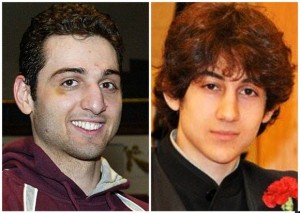The mainstream media are absent on the Misha story, preferring to let the discussion of Tamerlan Tsarnaev’s possible mentor devolve into hearsay reporting rather than to delve in-depth into the background of this Islamist. Perhaps he undermines the narrative that this was a couple of self-radicalized kids who were just taking out their anger at America for the wars in Iraq and Afghanistan.
Who is Misha? “Misha was an Armenian native and a convert to Islam and quickly began influencing his new friend, family members said,” according to the Associated Press. “Under the tutelage of a friend known to the Tsarnaev family only as Misha, Tamerlan gave up boxing and stopped studying music, his family said. He began opposing the wars in Afghanistan and Iraq. He turned to websites and literature claiming that the CIA was behind the terrorist attacks of Sept. 11, 2001, and Jews controlled the world.”
“Tamerlan loved music and, a few years ago, he sent Khozhugov [his brother-in-law] a song he’d composed in English and Russian,” continues the AP. “He said he was about to start music school.” Then, after talking with Misha, he decided that Islam could not support his musical goals.
“Musical instruments are considered haram (sinful) by Islamists,” outlines Abdel Bari Atwan in his recent book After bin Laden: Al Qaeda, the Next Generation. “Ibn Tamiyyah—a scholar widely admired by jihadis—said that music is ‘alcohol to one’s soul.’”
The younger Tsarnaev brother has confessed to the authorities that the Boston bombs were designed using the recipe outlined by al Qaeda in the Arabian Peninsula’s online jihadist magazine, Inspire. But, as the Misha connection shows, Tamerlan’s views may not have been only radicalized over the Internet—they were likely radicalized first at home. The Tsarnaev brothers’ uncle, Ruslan Tsarni told the Daily Mail that “that the man responsible was a cleric aged around 30 called Misha and that he was an Armenian who, unusually for such a largely Christian people, had converted to Islam.”
“As far as he knew Misha was based in a mosque that was a short drive from Cambridge and that he was new to Islam.”
Last weekend, Christian Caryl, a regular contributor to The New York Review of Books, located Misha, also known as Mikhail Allakhverdov. “He confirmed he was a convert to Islam and that he had known Tamerlan Tsarnaev, but he flatly denied any part in the bombings,” reports Caryl. The interview doesn’t indicate whether he was a cleric, as Uncle Tsarni alleged. “I wasn’t his teacher. If I had been his teacher, I would have made sure he never did anything like this,” Allakhverdov told Caryl.
The FBI would not disclose to Caryl whether Allakhverdov was connected to the bombing, so Caryl relies on statements by anonymous government officials that he had no connection to the bombing.
Regardless of whether Misha aided in the bombings, isn’t what he taught Tamerlan—that he might have radicalized him—still of interest?
The stories between Misha and Tamerlan’s uncle Tsarni are simply irreconcilable. “A close friend of the family in Boston said that Misha was not known to have visited Tamerlan at home,” reports Caryl. (Relatives said otherwise.) “I interviewed Allakhverdov in Russian and it seems likely that in whatever contact the two men had, they would have spoken Russian.”
If these two stories don’t match, then why aren’t the media digging deeper into this issue? Perhaps they are afraid of the Islamist angle. This piece by the Los Angeles Times does little but repeat the family’s side and Allakhverdov’s assertion that he was not Tamerlan’s teacher. The Boston Herald likewise reprinted his assertion, as did CBS Boston.
“CNN has made repeated efforts to speak with Allakhverdov, but has so far been unsuccessful,” report Josh Levs and Ben Brumfield for CNN. Allakhverdov is also not speaking to The Washington Post.
Todd Wallack and Lisa Wangness of the Boston Globe, in contrast, asked the hard questions. “The Review of Books published a brief account of the interview with Allakhverdov on its blog Sunday night, saying the item was part of a longer piece on the Tsarnaev family and Boston’s Russian and Chechen community to be published in a forthcoming edition of the journal,” they wrote for the Boston Globe. “But the brief account left many questions unanswered…There was no information about Tamerlan’s religious beliefs or politics, nor was there an explanation of why the two men stopped talking.”
Since Allakhverdov clearly has no interest in speaking to the press further, as evinced by his refusal to speak to the Post or CNN, perhaps a little investigative journalism is in order. These future stories should center around facts, not hearsay quotes from either party.
However, as of this writing the media appears to have dropped the story entirely, abrogating its journalistic duties.

No hay comentarios:
Publicar un comentario